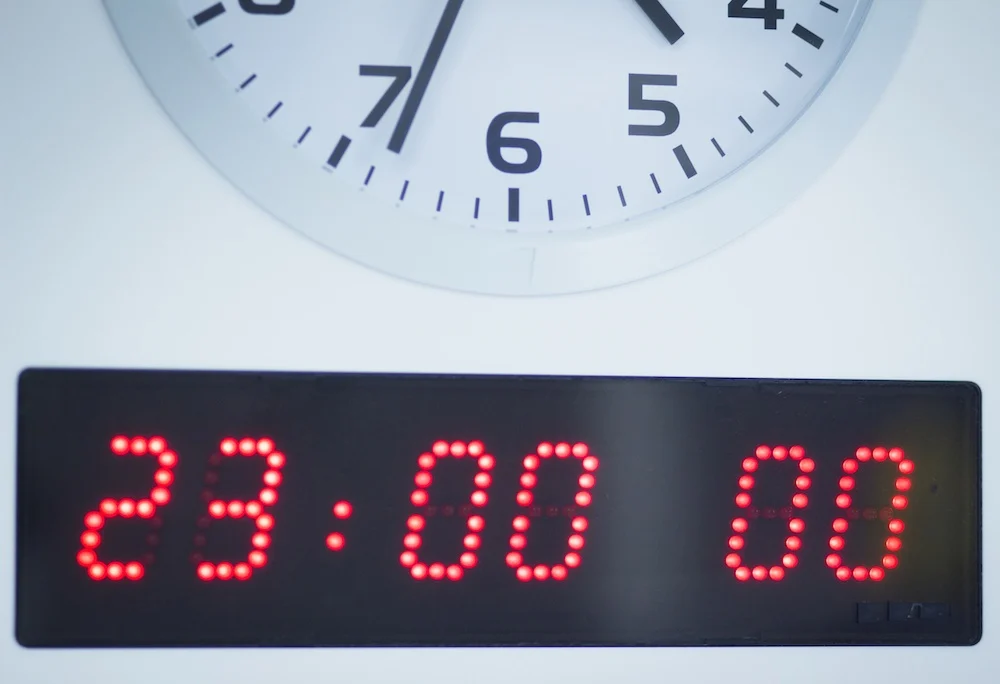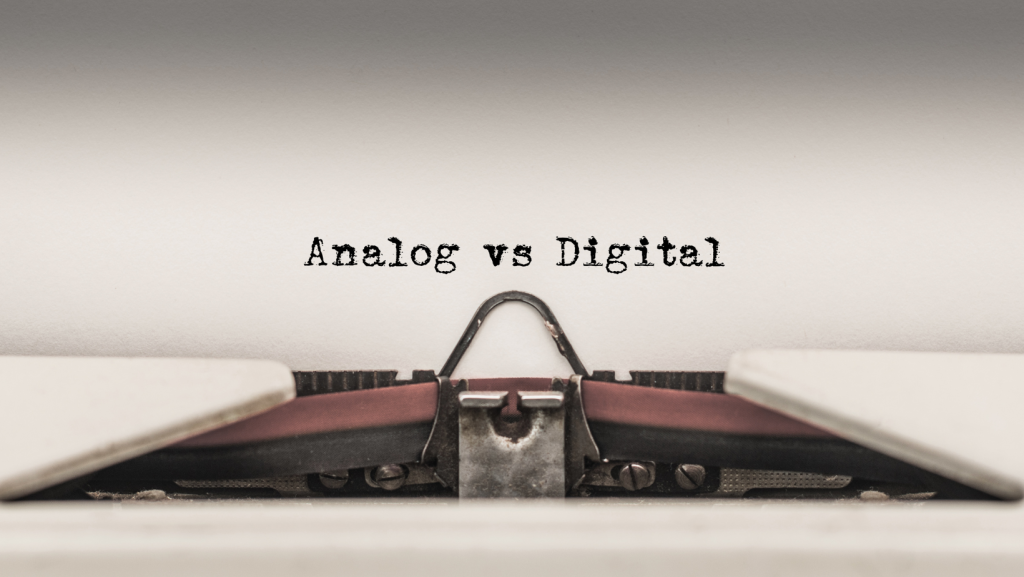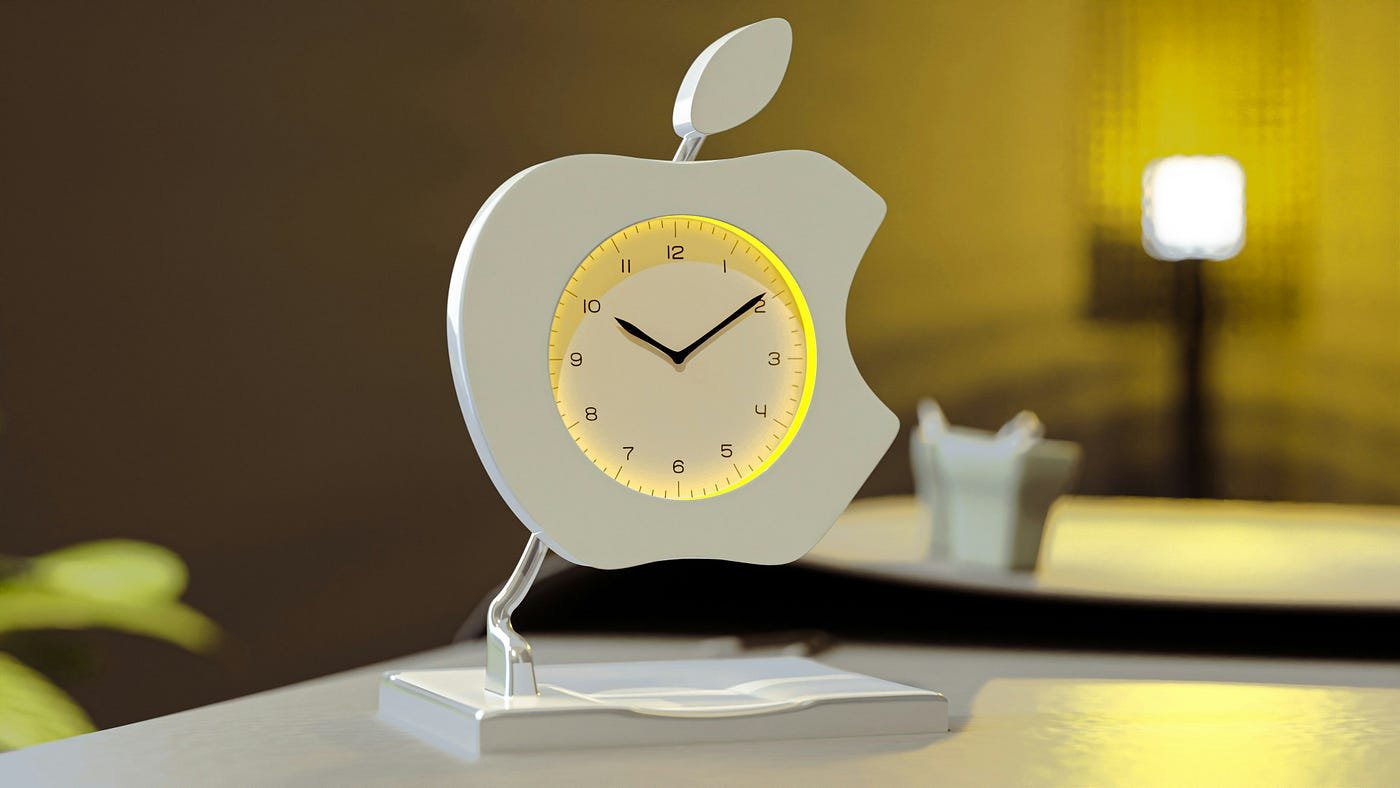Clocks have been around for centuries, evolving from simple mechanical designs to complex digital displays. When choosing between digital and analog clocks, understanding their distinct features, benefits, and drawbacks is essential. Both types offer unique advantages depending on your needs. Let’s explore the pros and cons of each.
Analog Clocks
Analog clocks are traditional timepieces with hour, minute, and sometimes second hands that rotate around a numbered dial. They have been a staple in homes, workplaces, and schools for generations.
Pros of Analog Clocks:
- Aesthetic Appeal: Analog clocks often feature elegant designs, from antique models to modern, minimalist styles, making them ideal for home décor.
- No Need for Batteries (in Mechanical Models): Many analog clocks, especially wind-up or weight-driven types, don’t require batteries or electricity.
- Easier to Learn Time-Telling: For children and learners, analog clocks help with understanding the concept of time, such as quarters of an hour.
- Variety of Designs: Analog clocks come in a wide range of designs, from classic wall clocks to intricate grandfather clocks, making them versatile for different settings.
- Longer Lifespan: Well-made analog clocks, especially mechanical ones, can last decades or even centuries with proper care.
Cons of Analog Clocks:

- Harder to Read at a Glance: Unlike digital clocks, reading an analog clock can take more time, especially if you’re not familiar with the positioning of the hands.
- Less Precision: While analog clocks are usually accurate, small discrepancies can occur, especially in mechanical versions.
- Maintenance: Mechanical analog clocks may require regular winding, and if not battery-powered, they need maintenance or repair over time.
Digital Clocks
Digital clocks display the time using numerical digits. They’re modern, practical, and are often integrated into everyday devices such as smartphones, computers, and appliances.
Pros of Digital Clocks:
- Easy to Read: The numerical display of a digital clock makes it quick and effortless to read the exact time, even at a glance.
- Precise Timekeeping: Digital clocks are typically more precise than analog clocks since they rely on electronic timekeeping mechanisms, often synchronized with atomic clocks.
- Additional Features: Many digital clocks come with added features, such as alarms, backlights, calendars, and even temperature displays.
- Compact and Portable: Digital clocks are available in small, portable designs that fit in various spaces, from bedside tables to car dashboards.
- Less Maintenance: Digital clocks generally require minimal maintenance. Many models only need a battery change or a power source to keep running.
Cons of Digital Clocks:
- Aesthetic Limitations: Digital clocks often lack the charm or decorative appeal of analog clocks, making them less ideal for those looking to enhance interior décor.
- Dependent on Power/Batteries: Digital clocks require electricity or batteries to function, making them vulnerable to outages or dead batteries.
- Less Intuitive for Learning: For children learning to tell time, digital clocks don’t provide the visual understanding of hours, minutes, and seconds in the way analog clocks do.
Which Clock is Right for You?
Choosing between a digital or analog clock depends on your personal needs and preferences.
- For Functionality: If precision, ease of reading, and added features like alarms or calendars are your priority, a digital clock is the better option.
- For Aesthetics: If you’re looking for a timeless piece that doubles as décor and helps reinforce an understanding of time, analog clocks may suit your needs better.
Conclusion
Both digital and analog clocks have their unique strengths and drawbacks. Analog clocks bring elegance and tradition into any space, while digital clocks offer precision and modern convenience. Whether you want to enhance your décor or simply need a clock that’s quick to read, choosing between digital and analog ultimately depends on how you value form and function.





Alright folks, lemme tell ya, 66win3 is the real deal! Tried it out last night and had a blast. Solid platform, easy to navigate, and the payouts were smooth. Definitely worth checkin’ out! Check them out here: 66win3
Alright, listen up! Hitclubvips is bringing the heat! Love the vibe and the exclusive feel. If you’re looking to up your game, this is your place. hitclubvips
Es gibt jedoch noch eine andere Möglichkeit, professionelle Unterstützung zu erhalten, und zwar per E-Mail – Dieses Mal beträgt der Geldbonus ebenfalls bis zu 100 Euro und wird zusammen mit 50 Freispielen verschenkt.
Um bei Woo Casino zu beginnen, navigieren Sie einfach zu woocasino.com/de und
klicken Sie auf “Registrieren”. Das Live-Casino bietet Dutzende von Spieltischen, so dass Sie alles spielen können, was Sie möchten.
Das Unternehmen wollte ein relativ einfaches Registrierungssystem
anbieten, das es allen Benutzern ermöglicht,
schnell zu spielen. Beim Erreichen jedes neuen Ranges erhalten die Spieler eine Belohnung
in Form eines Bonus oder in Form von Freispielen.
Geben Sie Ihre E-Mail-Adresse ein, wählen Sie ein Passwort und wählen Sie Österreich als Ihr Wohnsitzland – so einfach ist das.
Aber das ist noch nicht alles – jede Woche erhalten Sie
einen 10% Cashback-Bonus, der automatisch Ihrem Konto gutgeschrieben wird.
Erhalten Sie einen 100% Bonus bis zu 100 € sowie 150 Freispiele für den beliebten Slot Wolf Gold, wenn Sie nur 20 € oder mehr einzahlen und den Code “WOO” verwenden. Machen Sie sich bereit, Ihr Spielerkapital mit dem fantastischen Willkommensbonus
von Woo Casino zu steigern! Woo Casino ist
ein außergewöhnliches Online-Spielziel, das ein unvergleichliches Erlebnis für anspruchsvolle Spieler bietet.
Der Gründer von Woo Casino stellte sich eine Gaming-Plattform vor, die sich
an die Elite richtet und ein unvergleichliches Erlebnis bietet, das Luxus mit Innovation verbindet.
References:
https://online-spielhallen.de/cobra-casino-promo-code-ihr-schlussel-zu-mehr-spielspas/
Es ist ein Restaurant mit dem Thema Vereinigte Staaten, das eine Vielzahl von Steaks, Wein und Bieren aus den gesamten USA anbietet.
Auch die Brooklyn Bridge wurde verändert, indem der See, der sich ursprünglich unter ihr befand,
entfernt und die Plattform der Brücke abgeflacht wurde.
Dieser Schrein war ein Vorläufer des 9/11-Denkmals des Hotels und Casinos, das zwei
Jahre später errichtet wurde.
Das Hotel verfügt außerdem über eine Achterbahn, was selbst
in dieser Stadt eine Besonderheit ist. Egal, ob du in die Welt des
Glücksspiels eintauchen, kulinarische Genüsse erleben oder einfach nur
die beeindruckende Architektur und das Ambiente genießen möchtest,
das New York-New York bietet für jeden Geschmack etwas.
Der Big Apple Coaster bietet dazu noch eine
atemberaubende Achterbahnfahrt mit Blick auf den Las Vegas Strip.
Im New York-New York Hotel Las Vegas erwarten dich vielfältige Zimmeroptionen, die
von Standardzimmern bis zu luxuriösen Suiten reichen. Für Liebhaber der
italienischen Küche bietet „Il Fornaio“ eine Auswahl an Pasta,
Pizza und anderen italienischen Spezialitäten.
References:
https://online-spielhallen.de/meine-umfassenden-jet-casino-erfahrungen-ein-tiefer-einblick/
All supported options accept AUD, so you won’t lose money on currency conversion.
Making a deposit is simple — once logged in, you can head to the Payments section and choose from methods like Visa, Mastercard, POLi, bank transfer, or e-wallets.
However, online gambling regulations can vary between states, so
it’s important to check your local laws before signing
up. You’re not alone, and talking to someone can make a real difference.
If you feel gambling is becoming a problem, help is available.
Recognising the early signs — such as chasing
losses or hiding your gambling habits — is the first step to staying
safe.
Leon Casino Australia allows one personal account per player.
The site follows Responsible Gambling principles and offers tools for limits, time tracking and self-exclusion. Leon Casino Australia supports all main payment options used
by Australians.
References:
https://blackcoin.co/bridge-poker-rules/
I’ve scoured the best online casinos in Australia
for offers that give Aussie players real value, from welcome packages to loyalty rewards.
After weeks of testing, depositing, spinning, and cashing
out, I’ve narrowed down the top-rated real money online casinos Australia has to offer.
Our team of experts have reviewed Australia’s best online casinos in 2025 where you can play
the top online gambling games. No deposit bonuses allow players
to enjoy games without a deposit, offering a risk-free chance to explore
the casino’s offerings.
As a regular player, you can still get deposit rewards if you look out for
new casino bonus updates. Also, as players cross ranks, they get big
bonuses for moving up to a higher rank. 100% or even 200%
match is a good offer, and the players are allowed to deposit up to $1,000 or
even a bit more. Casinority provides only the most objective Australian online casino reviews on best Australian online casino sites.
If you enjoy the land casino experience, you’d love table games.
Brand-new gambling sites are a great opportunity for a variety of reasons.
Every player has specific preferences, and we wanted to make sure you don’t spend too much time looking at providers that don’t suit your personal gambling wishes and desires.
This is not to brag — we simply aim for perfection when creating any
review content for our AU players. As you know, there is a saying, “there’s always someone who does it better.” But what
could we say about countless casino review sites? To discover more best casinos in Australia, make sure to take
a peek at our expert guide. Perhaps it’s time to put it in the hands of Casinority
experts and allow us to guide you to the TOP new gambling sites of 2025 available
to the gamblers from AU.
Here you will find a 24hr casino, regular live entertainment and shows, several restaurants, and bars.
The Orpheus gaming lounge features a luxuriously appointed
lounge, private bar, various table games and electronic gaming
machines – including Townsville’s only smoking lounge.
With over 370 gaming machines and more than 20 table games,
The Ville Casino has so many ways to play,
earn and redeem.
In 2008, security staff at the casino and other venues took part
in a trial of head mounted cameras which were worn over the ear.
Between 1993 and 2001, the casino was defrauded of $5.7 million when corrupt casino
staff and food suppliers fabricated food orders and invoices.
Jupiters Hotel & Casino made headlines in 1995 when then Brisbane Broncos
Rugby League player Julian O’Neill urinated on the carpet under a black jack
table on two separate occasions. In 2011 it became part of Echo Entertainment Group when Tabcorp listed its casino assets.
The resort is connected to the adjacent Gold Coast Convention and Exhibition Centre.
The Star Grand still has the most hotel rooms of the
property, with 592 guest rooms. In recent years, the property has been expanded to include new hotels which are part of The Star Gold Coast.
In August 2015, work commenced on a $345 million redevelopment of the casino including the construction of a 17-storey tower.
By 2008, 442 of the hotel rooms were completely refurbished at the
cost of $16 million. The two gaming floors are now one and the
size is just over double of what it was. In 2009, Office of
Gaming acting executive director Barry Grimes criticised the casino’s internal
controls and procedures relating to excluded persons gaining entry to the casino.
References:
https://blackcoin.co/best-skrill-casinos-for-uk-players/
With the redesigned private gaming rooms Sovereign and Oasis, the land based casino delivers the finest in premium gaming experiences.
Mississippi stud poker, three card poker, Caribbean stud poker, and Texas Hold ’em
bonus poker are among the poker games available on the casino floor.
Only two poker tables are available in the poker room, with the majority of the games being Texas Hold ’em ($2/$3).
After you’ve finished spinning the reels, walk over to the
table games area to try your hand at your favorite table casino games.
More information on premium membership access and advantages will be sent to eligible members.
Alternatively, you might relax in your 5-star hotel room
and take in the beautiful scenery from your suite. Before you attend the latest stage play, meet up with friends and have a meal
before the night begins, or taste from the incredible buffet.
There are over six restaurants, and their website offers a handy online table reservation option. After hours, choose from outdoor bars, sports bars, or the neighborhood’s hotspot,
The Atrium Bar. You may enjoy lush manicured grounds, an enviable location, and five-star comfort whether you
stay at The Star Grand or The Darling. There are also spa services,
an outdoor pool area, and private cabanas.
View current jackpot sums for games like Golden Dollars
Grand, Dinomite, Highway Zone, Players Paradise Gold,
and more. The hosts will gladly answer any questions you may have about membership requirements and advantages.
There is no limit, and there is a buy-in ranging from $100 to $300 for Texas Hold ’em.
On both the Main Gaming Floor and the Private Gaming Room, there are over 1,400 pokies
and video poker machines, making it a pokies lover’s delight.
Below we take you through what you can expect from the casino
in detail. Many attractions are within walking distance of the
casino, located on the picturesque Gold Coast.
References:
https://blackcoin.co/how-to-read-your-rivals-hands-in-poker/
online casino mit paypal
References:
okbolt.co.kr
online casinos that accept paypal
References:
http://www.career4.co.kr/bbs/board.php?bo_table=ci_consulting&wr_id=351514
online casino for us players paypal
References:
https://hwekimchi.gabia.io/bbs/board.php?bo_table=free&tbl=&wr_id=1442971
casinos online paypal
References:
http://125.141.133.9:7001/bbs/board.php?bo_table=free&wr_id=7163692
online pokies paypal
References:
https://spin.org.pk/employer/top-payid-casinos-australia-2025-fast-secure-casino-payment/
casino con paypal
References:
https://zenithgrs.com/employer/best-online-casinos-in-2025-top-usa-gambling-sites/
Just a quick shout out for vn500daily. They seem to update their promotions pretty frequently, which is cool. Always something new to look out for. Give vn500daily a peek.